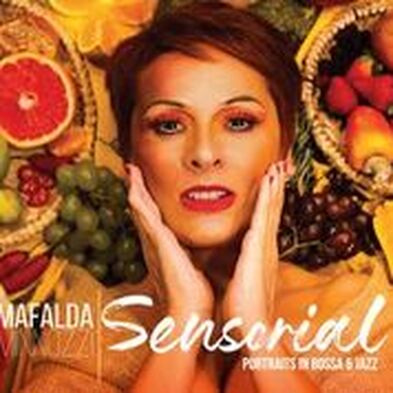
With tunes from Antonio Carlos Jobim and other Brazilian notables, Mafalda releases an album under the musical direction of guitarist Paul Ricci, delving deep into the Brazilian songbook while, at the same time, lacing Brazilian Bossa and New York City Jazz into a seamless and sensuous experience of mood, melody, and even some melancholy.
Mafalda is surrounded with brilliant musicians. Besides musical director Paul Ricci on guitars, Art Hirahara in on piano, Essiet Okon Essiet and Harvie S. split duties on acoustic bass, Victor Jones is on drums, with Rogerio Boccato on percussion, and Will Calhoun on the Udu drum and shaker on track seven.
The album is 13 tracks with Jobim composing or co-writing seven of them. That’s good enough for me.
But from the very beginning it becomes obvious that the Bossa will undergo a Jazz treatment and it will continue for the whole album.
The album opens with A Felicidades (Jobim). Let me say again what I have said for many times before. Portuguese is the most beautiful for lyrics and singing. And Mafalda nails it. Paul Ricci’s cool guitars along with Art Hirahara’s piano is just so fine. Harvie S on bass and Rogerio Boccato’s percussion lay a cool foundation for it all. Listen for the interlude based upon Baden Powell’s Consolaςāo. Baden Powell de Aquino was a brilliant Brazilian guitarist who combined so many musical influences and whose work with Elis Regina first captivated me. Ricci does a fantastic job of carrying across the moods and virtuosity of Baden Powell.
Vivo Sonhando (Jobim) is another stand-out with the ethereal guitar of Ricci and the cool Victor Jones beat. Mafalda is absolutely intoxicating. Hirahara gets some improvisational time as he and Mafalda create moments of exquisite beauty.
Morro Dois Irmāos (Chico Buarque) comes next. Francisco "Chico" Buarque de Hollanda is a Brazilian-born singer-songwriter, playwright, and more, who focused on the socio-economic conditions of his homeland. It is a terrific framework for Ricci’s guitars and the improv from the rest of the band. Pay attention to Mafalda’s vocalizations at the very end.
É Preciso Perdoar (Alcyvando Luz) opens with an introduction from Coltrane’s Lonnie’s Lament which Ricci and Hirahara perform to perfection. While Luz was an excellent composer and performer in is own right, Mafalda and Ricci take the piece to new heights with expanded vision and imagination.
Desafinado (Jobim) opens with Hirahara’s piano and is soon joined by Mafalda and Ricci. The rest of the band remain in the bullpen until half-way through the song. The guitar and piano serve as the principal instruments alongside Mafalda’s fine vocals.
Mocidade (Toninho Horta) is another fine showcase for Ricci. After all, Toninho Horta was called one of the top five guitarists in the world by UK’s Melody Maker magazine. Harvie S on bass is again cooking in the background. Make sure to hear him out.
Samba Da Benςāo is another contribution from Baden Powell. Percussionist Will Calhoun makes his only appearance on this track. Delicate guitar and piano work allow Calhoun’s contribution to come through and also makes for a shimmering framework for Mafalda’s gorgeous vocals.
Once I Loved (Jobim) changes over to English lyrics. Again, Ricci and Hirahara weave their magic together for the reflective tune. Boccato’s percussion gently propels the music at a sweet pace as Mafalda makes this piece her very own.
Triste is another Jobim piece that flowers under the gentle treatment of Mafalda and the band. It’s hard to ruin a Jobim piece but it is also difficult to render it in ways that make the listener say, “Oooohhh, yeahhhh.” Mafalda and Ricci make that happen every time.
Chega De Saudade (Jobim) isn’t as sad as the title suggests. Mafalda turns longing into anticipation. Masterful.
Jogral (Djavan/Neto/Machado) opens with beautiful guitar and piano work. So help me, I thought I heard a flute but it was Ricci’s incredible taste and tone. Mafalda improvises with vocalizations that are energetic and fun.
Un’ Altro Addio (Toquinho/Moraes/Bardotti) is sung in Italian. It is Another Goodbye and again Mafalda keeps the melancholy at bay with an upbeat, energetic delivery.
The album concludes with Jobim’s Dindi. It is the second song on the album to be sung in English. Mafalda makes English as sweet as Portuguese. Dindi (pronounced Jin-jee) is a standard of Brazilian Bossa and rightfully so. Mafalda would have made it so, were it not already.
Mafalda Minnozzi has brought forward everything she learned and enjoyed in her sojourn in Brazil. Under the musical direction of Paul Ricci and the talent of Art Hirahara and the others, Sensorial: Portraits in Bossa & Jazz breathes fresh life into music we have loved for so long.
~Travis Rogers, Jr. is The Jazz Owl
 RSS Feed
RSS Feed
